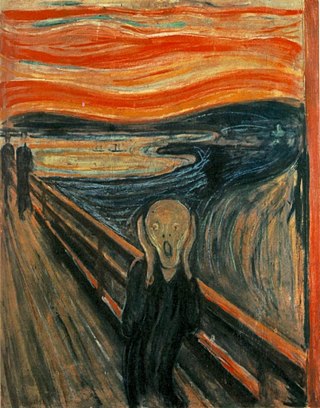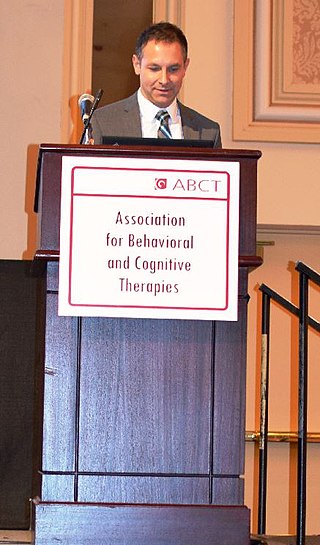
Cognitive behavioral therapy (CBT) is a form of psychotherapy that aims to reduce symptoms of various mental health conditions, primarily depression, PTSD and anxiety disorders. Cognitive behavioral therapy focuses on challenging and changing cognitive distortions and their associated behaviors to improve emotional regulation and develop personal coping strategies that target solving current problems. Though it was originally designed to treat depression, its uses have been expanded to include many issues and the treatment of many mental health and other conditions, including anxiety, substance use disorders, marital problems, ADHD, and eating disorders. CBT includes a number of cognitive or behavioral psychotherapies that treat defined psychopathologies using evidence-based techniques and strategies.

Anxiety disorders are a group of mental disorders characterized by significant and uncontrollable feelings of anxiety and fear such that a person's social, occupational, and personal functions are significantly impaired. Anxiety may cause physical and cognitive symptoms, such as restlessness, irritability, easy fatigue, difficulty concentrating, increased heart rate, chest pain, abdominal pain, and a variety of other symptoms that may vary based on the individual.

Hoarding disorder (HD) or Plyushkin's disorder, is a mental disorder characterised by persistent difficulty in parting with possessions and engaging in excessive acquisition of items that are not needed or for which no space is available. This results in severely cluttered living spaces, distress, and impairment in personal, family, social, educational, occupational, or other important areas of functioning. Excessive acquisition is characterized by repetitive urges or behaviours related to amassing or buying property. Difficulty discarding possessions is characterized by a perceived need to save items and distress associated with discarding them. Accumulation of possessions results in living spaces becoming cluttered to the point that their use or safety is compromised. It is recognised by the eleventh revision of the International Classification of Diseases (ICD-11) and the Diagnostic and Statistical Manual of Mental Disorders, 5th edition (DSM-5).

An intrusive thought is an unwelcome, involuntary thought, image, or unpleasant idea that may become an obsession, is upsetting or distressing, and can feel difficult to manage or eliminate. When such thoughts are paired with obsessive–compulsive disorder (OCD), Tourette syndrome (TS), depression, body dysmorphic disorder (BDD), and sometimes attention deficit hyperactivity disorder (ADHD), the thoughts may become paralyzing, anxiety-provoking, or persistent. Intrusive thoughts may also be associated with episodic memory, unwanted worries or memories from OCD, post-traumatic stress disorder (PTSD), other anxiety disorders, eating disorders, or psychosis. Intrusive thoughts, urges, and images are of inappropriate things at inappropriate times, and generally have aggressive, sexual, or blasphemous themes.
Sexual obsessions are persistent and unrelenting thoughts about sexual activity. In the context of obsessive-compulsive disorder (OCD), these are extremely common, and can become extremely debilitating, making the person ashamed of the symptoms and reluctant to seek help. A preoccupation with sexual matters, however, does not only occur as a symptom of OCD, they may be enjoyable in other contexts.
Exposure therapy is a technique in behavior therapy to treat anxiety disorders. Exposure therapy involves exposing the patient to the anxiety source or its context. Doing so is thought to help them overcome their anxiety or distress. Numerous studies have demonstrated its effectiveness in the treatment of disorders such as generalized anxiety disorder (GAD), social anxiety disorder (SAD), obsessive-compulsive disorder (OCD), post-traumatic stress disorder (PTSD), and specific phobias.
Prolonged exposure therapy (PE) is a form of behavior therapy and cognitive behavioral therapy designed to treat post-traumatic stress disorder. It is characterized by two main treatment procedures – imaginal and in vivo exposures. Imaginal exposure is repeated 'on-purpose' retelling of the trauma memory. In vivo exposure is gradually confronting situations, places, and things that are reminders of the trauma or feel dangerous. Additional procedures include processing of the trauma memory and breathing retraining.

Obsessive–compulsive disorder (OCD) is a mental and behavioral disorder in which an individual has intrusive thoughts and feels the need to perform certain routines (compulsions) repeatedly to relieve the distress caused by the obsession, to the extent where it impairs general function.
Stanley Jack Rachman was a South African-born psychologist who worked primarily with obsessive-compulsive disorder (OCD) and other anxiety disorders. He spent much of his career based in the UK and Canada.
Adam Scott Radomsky is a Canadian psychologist who studies obsessive-compulsive disorder (OCD) and related anxiety disorders. He is a professor in the Department of Psychology at Concordia University in Montreal, Canada, and was editor-in-chief of the Journal of Behavior Therapy and Experimental Psychiatry.

The effects of stress on memory include interference with a person's capacity to encode memory and the ability to retrieve information. Stimuli, like stress, improved memory when it was related to learning the subject. During times of stress, the body reacts by secreting stress hormones into the bloodstream. Stress can cause acute and chronic changes in certain brain areas which can cause long-term damage. Over-secretion of stress hormones most frequently impairs long-term delayed recall memory, but can enhance short-term, immediate recall memory. This enhancement is particularly relative in emotional memory. In particular, the hippocampus, prefrontal cortex and the amygdala are affected. One class of stress hormone responsible for negatively affecting long-term, delayed recall memory is the glucocorticoids (GCs), the most notable of which is cortisol. Glucocorticoids facilitate and impair the actions of stress in the brain memory process. Cortisol is a known biomarker for stress. Under normal circumstances, the hippocampus regulates the production of cortisol through negative feedback because it has many receptors that are sensitive to these stress hormones. However, an excess of cortisol can impair the ability of the hippocampus to both encode and recall memories. These stress hormones are also hindering the hippocampus from receiving enough energy by diverting glucose levels to surrounding muscles.

Richard McNally is an American psychologist and director of clinical training at Harvard University's department of psychology. As a clinical psychologist and experimental psycho-pathologist, McNally studies anxiety disorders and related syndromes, such as post-traumatic stress disorder, obsessive–compulsive disorder, and complicated grief.
The University of Florida Obsessive–Compulsive Disorder Program is a treatment and research clinic in the Department of Psychiatry at the University of Florida. The clinic is located in Gainesville, Florida.
Safety behaviors are coping behaviors used to reduce anxiety and fear when the user feels threatened. An example of a safety behavior in social anxiety is to think of excuses to escape a potentially uncomfortable situation. These safety behaviors, although useful for reducing anxiety in the short term, might become maladaptive over the long term by prolonging anxiety and fear of nonthreatening situations. This problem is commonly experienced in anxiety disorders. Treatments such as exposure and response prevention focus on eliminating safety behaviors due to the detrimental role safety behaviors have in mental disorders. There is a disputed claim that safety behaviors can be beneficial to use during the early stages of treatment.
Adrian Wells, CPsychol, is a British clinical psychologist who is the creator of metacognitive therapy. He is Professor of Clinical and Experimental Psychopathology at the University of Manchester, U.K. and is also Professor II of Clinical Psychology at the Norwegian University of Science and Technology.

Jonathan Stuart Abramowitz is an American clinical psychologist and Professor in the Department of Psychology and Neuroscience at the University of North Carolina at Chapel Hill (UNC-CH). He is an expert on obsessive-compulsive disorder (OCD) and anxiety disorders whose work is highly cited. He maintains a research lab and currently serves as the Director of the UNC-CH Clinical Psychology PhD Program. Abramowitz approaches the understanding and treatment of psychological problems from a cognitive-behavioral perspective.
The Dimensional Obsessive-Compulsive Scale (DOCS) is a 20-item self-report instrument that assesses the severity of Obsessive-Compulsive Disorder (OCD) symptoms along four empirically supported theme-based dimensions: (a) contamination, (b) responsibility for harm and mistakes, (c) incompleteness/symmetry, and (d) unacceptable (taboo) thoughts. The scale was developed in 2010 by a team of experts on OCD led by Jonathan Abramowitz, PhD to improve upon existing OCD measures and advance the assessment and understanding of OCD. The DOCS contains four subscales that have been shown to have good reliability, validity, diagnostic sensitivity, and sensitivity to treatment effects in a variety of settings cross-culturally and in different languages. As such, the DOCS meets the needs of clinicians and researchers who wish to measure current OCD symptoms or assess changes in symptoms over time.
Jonathan S. Comer. is an American psychologist who is a Professor of Psychology and Psychiatry at Florida International University. He is currently the director of an interdisciplinary clinical research program called the Mental health Interventions and Novel Therapeutics (MINT) Program. The MINT program focuses on improving the quality, scope, and accessibility of mental health care. Comer also serves as director of the Network for Enhancing Wellness in Disaster-Affected Youth, a SAMHSA-funded program in the National Child Traumatic Stress Network (NCTSN) that provides trauma-informed training and consultation to youth-serving professionals in disaster-prone and disaster-hit regions. Comer is a Fellow of the American Psychological Association and a leader in the field of clinical child and adolescent psychology. The author of over 250 scientific papers and chapters, he has received early career awards from the American Psychological Association, the Association for Psychological Science, and the Association for Behavioral and Cognitive Therapies for his work. His research has been funded by federal agencies and by several private foundations and non-profit organizations. He has also received funding from the Andrew Kukes Foundation for Social Anxiety.
Bunmi O. Olatunji is an American psychologist who is Gertrude Conaway Vanderbilt Chair in Social Sciences at Vanderbilt University. He is Director of the Emotion and Anxiety Research Laboratory and Associate Dean of Academic Affairs for the Vanderbilt University Graduate School. Olatunji studies the psychopathology of obsessive–compulsive disorder.
J. Gayle Beck is a licensed clinical psychologist who specializes in trauma stress disorders and anxiety disorders. She is the Lillian and Morrie Moss Chair of Excellence in the Department of Psychology at the University of Memphis.








